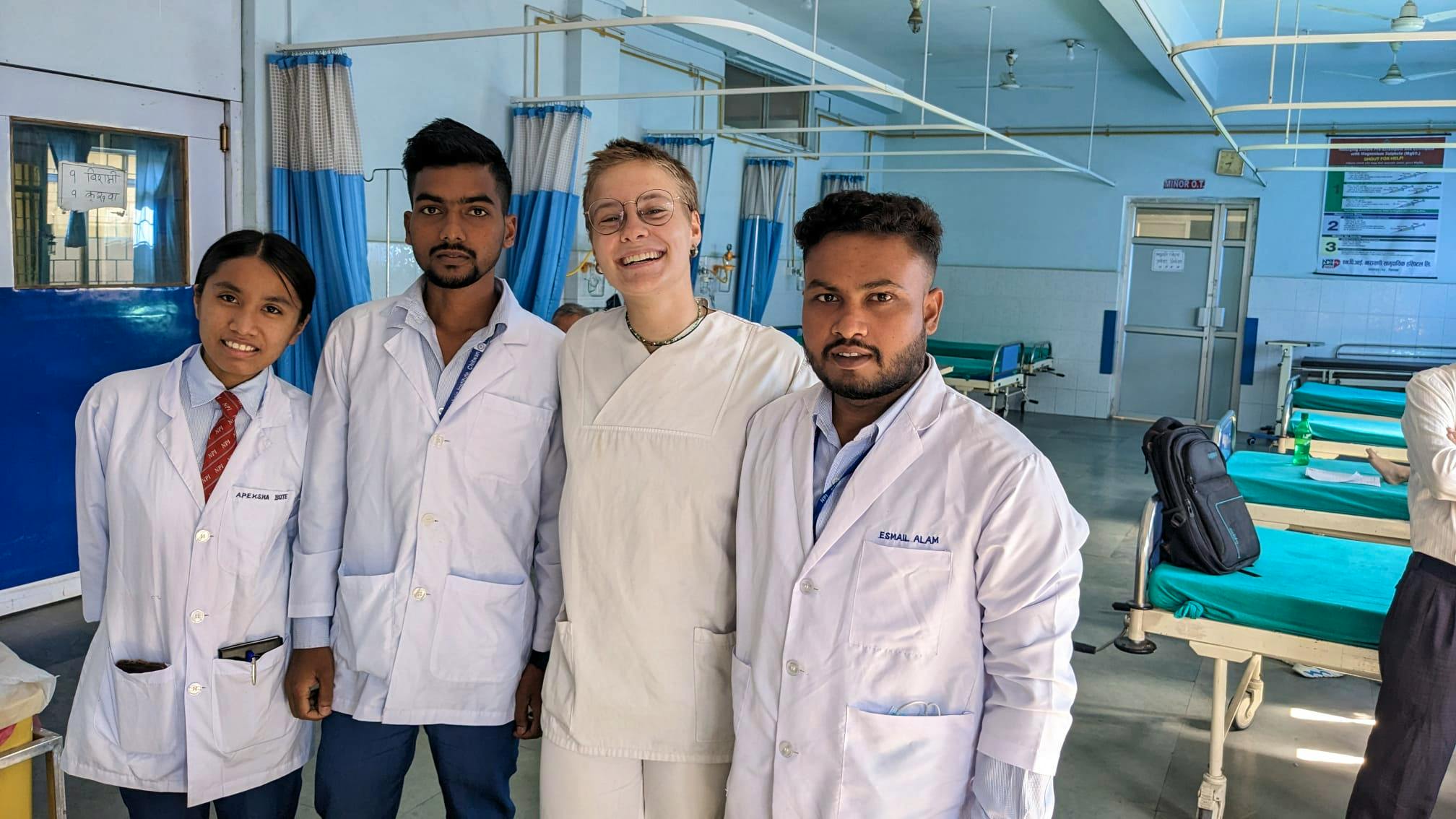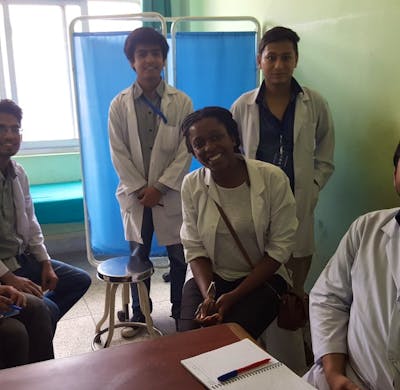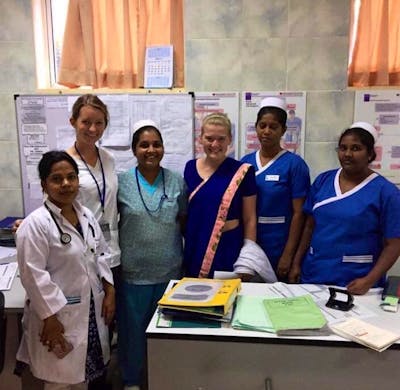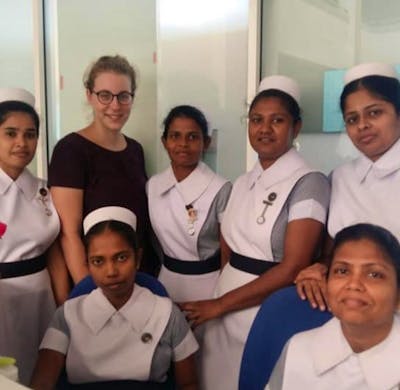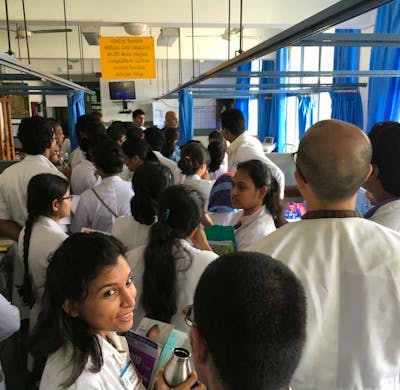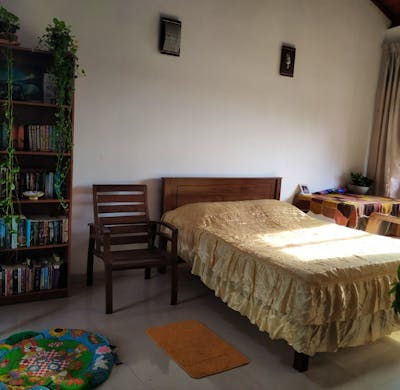A medical internship in Sri Lanka offers an invaluable opportunity for medical students, recent graduates, or healthcare professionals to gain hands-on experience in a clinical setting. Typically lasting from a few weeks to several months, these internships can be based in urban or rural hospitals, clinics, or healthcare facilities, depending on the program's focus. Interns may have the privilege of observing and assisting local healthcare professionals in various medical procedures, patient care tasks, and even community health education initiatives. Requirements often include a medical background, proficiency in English, and the necessary visas and permits. While medical internships may have associated costs, they provide a unique chance to expand medical knowledge, develop clinical skills, and contribute to healthcare in a developing country like Sri Lanka. To find specific opportunities, aspiring interns can conduct online research, reach out to medical institutions and organizations in Sri Lanka, and explore international volunteer placement agencies or academic institution resources.
The Importance
The importance of a medical internship program in Sri Lanka, or any similar initiative in a developing country, lies in its multifaceted benefits for both the participants and the local healthcare system. Here are some key reasons why such programs are important:
- Skill Development: Medical internships provide participants with hands-on experience, allowing them to hone their clinical skills and gain exposure to medical procedures and practices they may not encounter in their home countries. This practical experience can be invaluable for their future medical careers.
- Global Perspective: Working in a different healthcare system exposes participants to diverse medical challenges, patient demographics, and cultural contexts. This global perspective can enhance their ability to adapt to different healthcare settings and work effectively with patients from various backgrounds.
- Cultural Competence: Interns have the opportunity to immerse themselves in a different culture and interact with patients and healthcare professionals from diverse backgrounds. This experience fosters cultural competence, a crucial skill in providing patient-centered care in an increasingly multicultural world.
- Contribution to Underserved Communities: Many developing countries, including Sri Lanka, face healthcare challenges and resource limitations. Medical interns can make a meaningful contribution by providing healthcare services to underserved communities, thereby improving access to medical care.
- Capacity Building: International medical interns can support the local healthcare system by relieving the burden on overworked local healthcare professionals. They can assist with patient care, allowing local staff to focus on more complex cases or tasks.
- Health Education: Some programs include community outreach and health education components. Interns can help educate local communities about preventive healthcare measures, nutrition, and disease management, contributing to improved public health outcomes.
- Research Opportunities: In addition to clinical experience, internships may involve research projects. This research can lead to valuable insights and solutions that address local healthcare challenges.
- Cross-Cultural Exchange: These programs promote cross-cultural exchange and collaboration between medical professionals and students from different countries. Such interactions foster mutual understanding and international cooperation in healthcare.
- Personal Growth: Beyond the professional benefits, participating in a medical internship abroad can be a transformative personal experience. It can broaden one's horizons, increase self-confidence, and promote adaptability and resilience.
- Building a Global Healthcare Workforce: By participating in these programs, individuals can become part of a global network of healthcare professionals dedicated to addressing global health disparities and improving healthcare worldwide.
The Issues
Sri Lanka, like many countries, faces a range of social issues that impact its population. While the specific challenges and priorities may evolve over time, as of my last knowledge update in September 2021, some of the prominent social issues in Sri Lanka included:
- Ethnic and Religious Tensions: Sri Lanka has a history of ethnic and religious tensions, particularly between the majority Sinhalese Buddhist population and the Tamil ethnic minority, which is primarily Hindu. These tensions have led to conflict and violence in the past and continue to be a significant social issue.
- Post-Conflict Reconciliation: Following the end of a long and brutal civil conflict in 2009, reconciliation efforts have been a crucial social issue. Rebuilding trust, reintegrating former combatants, and addressing the grievances of affected communities are ongoing challenges.
- Economic Disparities: Economic inequality and disparities in access to basic services are social issues affecting many Sri Lankans. Rural communities often have less access to healthcare, education, and economic opportunities compared to urban areas.
- Unemployment and Underemployment: High levels of youth unemployment and underemployment are pressing concerns. Many young Sri Lankans struggle to find stable and fulfilling employment opportunities, which can lead to frustration and social unrest.
- Education: While Sri Lanka has made significant progress in expanding access to education, challenges remain in maintaining educational quality and addressing disparities in access to quality education, especially in rural areas.
- Healthcare: The healthcare system faces challenges in providing quality and accessible healthcare services to all citizens. Access to healthcare can be particularly challenging in remote areas.
- Corruption: Corruption in both the public and private sectors has been a longstanding issue. Efforts to combat corruption and improve governance have been ongoing.
- Environmental Concerns: Environmental issues such as deforestation, land degradation, and water pollution are increasingly pressing. Climate change impacts, including rising sea levels, also pose a threat to coastal communities.
- Gender Inequality: Gender-based discrimination and violence against women are social issues that need attention. Efforts to promote gender equality and women's empowerment are ongoing.
- Migrant Worker Issues: Sri Lanka has a significant number of migrant workers, and issues related to their rights, working conditions, and protection abroad are important social concerns.
The Solution
Solving social issues in Sri Lanka, as in any country, requires a multifaceted approach involving government initiatives, civil society organizations, community efforts, and international cooperation. Here are some ways in which people and organizations work to address the social issues facing Sri Lanka:
- Government Policies and Programs: The Sri Lankan government plays a significant role in addressing social issues through policy development and implementation. This includes initiatives to improve education, healthcare, and social services, as well as efforts to promote reconciliation, economic development, and good governance.
- Reconciliation and Peacebuilding: Various reconciliation programs aim to bridge ethnic and religious divides and promote understanding among different communities. Truth and reconciliation commissions, cultural exchange programs, and community dialogues are some strategies used.
- NGOs and Civil Society: Non-governmental organizations (NGOs) and civil society groups often work on the ground to address social issues. They may provide essential services, advocate for policy changes, and engage in community development projects. For instance, organizations like Sarvodaya and the Center for Policy Alternatives work on various social issues.
- Education and Awareness: Raising awareness about social issues is a crucial step in addressing them. Advocacy campaigns, workshops, and public awareness programs aim to inform people about issues like gender equality, health, and environmental conservation.
- International Aid and Cooperation: Sri Lanka receives international assistance and cooperation from organizations like the United Nations, World Bank, and various donor countries. This support may fund development projects, humanitarian aid, and capacity-building efforts.
- Community-Based Initiatives: Local communities often play a pivotal role in addressing social issues. Grassroots organizations and community leaders may develop and implement solutions tailored to the specific needs of their areas.
- Youth Engagement: Engaging young people in addressing social issues is vital. Youth-led organizations and initiatives can promote positive change, advocate for their peers, and drive community development projects.
- Legal Reforms: Advocacy for legal reforms and the enforcement of existing laws can help combat issues like corruption and gender-based violence. Organizations and activists may work to hold those responsible accountable.
- Healthcare and Education Access: Initiatives to improve healthcare and education access may include building new facilities, providing scholarships, and training healthcare workers and teachers.
- Environmental Conservation: Conservation organizations and community-led initiatives work to protect the environment through reforestation, waste management programs, and awareness campaigns.
- Promoting Women's Rights: Women's rights organizations advocate for gender equality and work to eliminate discrimination and violence against women. They may provide support services, legal aid, and empowerment programs.
- Migrant Worker Support: Organizations and government agencies often collaborate to protect the rights and well-being of Sri Lankan migrant workers abroad. This includes monitoring working conditions and providing assistance when needed.
A medical internship program, often referred to as a medical elective or clinical rotation, is an educational and experiential opportunity for medical students, recent graduates, or healthcare professionals to gain practical, hands-on experience in a clinical or hospital setting. These programs are typically designed to provide participants with real-world exposure to medical practice, patient care, and the healthcare system.
About the Program
Here's what a medical internship program is generally about:
- Clinical Experience: Medical internships offer participants the chance to work alongside experienced healthcare professionals, such as doctors, nurses, and specialists. During their time in the program, interns observe and, depending on their level of training, may assist with various medical procedures, examinations, and treatments. This hands-on experience helps them develop clinical skills and familiarity with medical practices.
- Medical Education: Interns have the opportunity to apply their medical knowledge in real clinical situations. They may learn about different medical specialties, diagnostic techniques, treatment modalities, and patient management strategies.
- Exposure to Diverse Cases: Medical internship programs often expose participants to a wide range of medical conditions and patient demographics. This exposure can be particularly valuable for broadening their clinical expertise and understanding of healthcare challenges.
- Professional Development: Beyond medical skills, internships contribute to the professional development of participants. They learn how to work within a healthcare team, communicate with patients, and navigate the healthcare system.
- Cultural and Global Experience: Medical internships abroad, like those in Sri Lanka or other countries, provide a unique opportunity for cross-cultural and global exposure. Interns may interact with patients from diverse cultural backgrounds, which fosters cultural competence and sensitivity.
- Contributing to Healthcare: Depending on the program, interns may actively contribute to patient care, particularly in underserved or resource-limited settings. Their involvement can help alleviate the workload of local healthcare professionals and improve access to care in those areas.
- Research and Learning: Some internship programs may include research components, allowing participants to engage in medical research projects or clinical studies.
- Career Exploration: Medical internships can help participants confirm their career choices or explore different medical specialties. They gain insight into what it's like to work in various healthcare settings, such as hospitals, clinics, or community health centers.
- Networking: Internships provide opportunities to network with healthcare professionals, colleagues, and mentors, which can be valuable for future career opportunities and collaborations.
It's important to note that the specific focus, duration, and structure of medical internship programs can vary widely. Some programs are offered by medical schools as part of the curriculum, while others are organized by hospitals, clinics, or volunteer organizations. Additionally, the eligibility criteria and requirements for participating in a medical internship program may differ depending on the institution or country.
Your Role
The role of a volunteer in a medical internship program or healthcare-related volunteer program can vary depending on the specific organization, location, and the volunteer's qualifications. However, here are some common roles and responsibilities that volunteers may have in such programs:
- Assisting Healthcare Professionals: Volunteers often work alongside doctors, nurses, and other healthcare professionals to provide support in various aspects of patient care. This may include taking vital signs, helping with medical procedures, and assisting with patient documentation.
- Patient Interaction: Volunteers may spend time interacting with patients, providing emotional support, and helping to address their non-medical needs. Building rapport with patients and offering companionship can be an essential part of the role.
- Health Education: Some programs involve community outreach and health education initiatives. Volunteers may lead or assist in health education sessions, teaching communities about preventive healthcare measures, nutrition, and hygiene practices.
- Administrative Tasks: Volunteers might be responsible for administrative tasks within healthcare facilities, such as organizing medical records, scheduling appointments, or assisting with clerical duties.
- Language Interpretation: If volunteers are proficient in a local language or possess language skills needed in healthcare settings, they may serve as interpreters to facilitate communication between healthcare providers and patients who speak different languages.
- Community Engagement: Volunteers may engage with the local community to understand their healthcare needs and facilitate access to healthcare services. This could involve organizing health camps, awareness programs, or conducting surveys.
- Supporting Specialized Care: In some cases, volunteers with specialized medical skills or training (e.g., dentists, pharmacists, physical therapists) may provide specialized care under the supervision of licensed professionals.
- Research Assistance: In research-focused healthcare programs, volunteers may assist in data collection, analysis, and research projects related to healthcare or public health issues.
- Emergency Response: Depending on the program and location, volunteers may be trained to assist in emergency response situations, such as disaster relief efforts or providing medical care during crises.
- Cultural Exchange: Volunteers often have the opportunity to engage with and learn from the local community, gaining a deeper understanding of cultural norms, traditions, and healthcare practices.
- Advocacy and Fundraising: Some volunteers may engage in advocacy or fundraising activities to support healthcare initiatives, raise awareness of healthcare challenges, or secure resources for medical facilities.
- Documentation and Reporting: Volunteers may be responsible for documenting their activities, patient data, or program outcomes to help track progress and evaluate the impact of the program.
It's important to note that the specific roles and responsibilities of volunteers can vary widely based on the program's goals, the level of training and experience of the volunteers, and the needs of the healthcare facility or community being served. Before volunteering, individuals should clarify their roles and responsibilities with the program organizers and ensure they are adequately prepared for their duties.
The Location
The city of Wattala situated in the western coastal region of Sri Lanka, presents a complex environment characterized by a mix of challenges and opportunities that shape its socio-economic landscape. These challenges provide a unique context for volunteering activities aimed at addressing and mitigating the issues faced by the
community:
- Urban and Slum Areas: Wattalas urban fabric is interwoven with slum areas marked by inadequate infrastructure, limited access to basic services, and substandard living conditions. These conditions often lead to heightened vulnerabilities and inequalities among the population.
- Poverty-Stricken Areas: Poverty is pervasive in various pockets of the city, limiting families access to fundamental resources such as education, healthcare, and proper nutrition. Economic disparities contribute to a cycle of disadvantage.
- Social Issues: The presence of poverty is closely linked to broader social issues, including limited employment opportunities, lack of access to quality education, and inadequate healthcare services. These issues further perpetuate socio-economic inequalities.
- Substance Abuse and Addiction: Wattala grapples with a significant prevalence of adults addicted to alcohol and drugs. This not only results in family instability and neglect but also contributes to the perpetuation of the cycle of poverty and social disintegration.
- Illegal Activities: Some community members are engaged in illegal activities such as smuggling and drug-related businesses. These activities not only foster social instability but also contribute to economic disparities within the city.
- Educational Challenges: The lack of education among parents and adults in these areas serves as a barrier to proper education for children. The absence of educational foundations limits children future prospects and perpetuates intergenerational poverty.
In summary, Wattala complex challenges provide a meaningful context for volunteering activities that can create positive change. By addressing educational gaps, promoting awareness, fostering positive role models, and contributing to community development, volunteers have the potential to alleviate some of the burdens faced by the city vulnerable populations.
What we expect
When organizations or programs engage volunteers, they typically have certain expectations and requirements to ensure that volunteers contribute effectively to their mission and goals. What is expected from a volunteer can vary depending on the specific program and its objectives, but here are some common expectations:
- Commitment: Volunteers are expected to commit to the agreed-upon schedule and duration of their service. Punctuality and reliability are essential to ensure the smooth operation of the program.
- Responsibility: Volunteers should take their roles and responsibilities seriously. This includes completing assigned tasks, following instructions, and adhering to program policies and guidelines.
- Professionalism: Volunteers are often expected to maintain a professional demeanor and attitude while representing the organization. This includes being respectful, courteous, and maintaining confidentiality when necessary.
- Teamwork: Collaboration and teamwork are crucial for many volunteer programs. Volunteers should work well with fellow volunteers, staff, and community members if applicable, contributing to a positive and productive team environment.
- Adaptability: Volunteers should be flexible and adaptable, as the needs of the program or the community may change. Being open to new challenges and adjusting to unforeseen circumstances is important.
- Cultural Sensitivity: For international volunteer programs, cultural sensitivity and respect for local customs and traditions are essential. Volunteers should strive to understand and appreciate the culture of the community they are serving.
- Communication: Effective communication is key. Volunteers should communicate clearly and promptly with program coordinators, fellow volunteers, and, when applicable, with patients or community members.
- Safety: Volunteers are expected to prioritize safety, both for themselves and others. They should adhere to safety protocols and guidelines provided by the program, especially in healthcare settings.
- Learning and Growth: Volunteers should be open to learning and personal growth. Many programs offer training and opportunities for skill development, and volunteers should take advantage of these resources.
- Respect for Boundaries: Volunteers should respect professional and ethical boundaries in healthcare or other settings. This includes maintaining patient confidentiality and following ethical guidelines.
- Initiative: While volunteers may be assigned specific tasks, showing initiative by identifying needs and offering assistance can be highly valuable.
- Positive Attitude: A positive attitude can have a significant impact on the program's atmosphere and outcomes. Volunteers are expected to maintain a constructive and optimistic outlook.
- Feedback: Some programs may request feedback or evaluations from volunteers to improve the program. Providing constructive feedback based on their experiences is often appreciated.
- Compliance: Volunteers are expected to comply with any legal or administrative requirements, such as obtaining the necessary visas or permits when volunteering internationally.
It's important for volunteers to have a clear understanding of what is expected of them before they begin their service. Communication with program coordinators or organizers can help clarify expectations and responsibilities. Additionally, volunteering is a two-way relationship, and volunteers should also expect to receive support, guidance, and a meaningful experience in return for their service.
What you can expect
As program organizers or host institutions, there are several important considerations and expectations that volunteers can typically expect from you to ensure a positive and fulfilling volunteer experience. These expectations often revolve around support, guidance, safety, and a meaningful experience. Here are some of the things that volunteers can expect from program organizers:
- Orientation and Training: Volunteers can expect to receive comprehensive orientation and training at the beginning of their service. This training may cover program objectives, roles and responsibilities, safety protocols, cultural considerations (for international programs), and any necessary skills or knowledge relevant to their tasks.
- Clear Expectations: Program organizers should communicate clear expectations regarding volunteer roles and responsibilities. Volunteers should have a thorough understanding of what is expected of them during their service.
- Supervision and Support: Volunteers can expect to have access to supervision and support from program coordinators or designated staff members. This includes guidance, feedback, and a point of contact for questions or concerns.
- Safety Measures: Ensuring the safety and well-being of volunteers is a top priority. Volunteers should expect program organizers to have safety measures in place, including protocols for handling emergencies or unexpected situations.
- Accommodations and Logistics: If the program provides accommodations and logistical support (such as transportation or meals), volunteers can expect these services to be organized and provided as promised. Any logistical arrangements should be clearly communicated in advance.
- Cultural Sensitivity: For international programs, volunteers can expect program organizers to promote cultural sensitivity and provide guidance on local customs, traditions, and appropriate behavior.
- Feedback and Evaluation: Volunteers often appreciate opportunities to provide feedback about their experiences. Program organizers can expect to collect feedback from volunteers to improve the program and address any issues that may arise.
- Learning and Development: Many volunteers seek opportunities for personal and professional growth. Program organizers can provide access to resources, training, and experiences that contribute to the volunteers' learning and development.
- Meaningful Tasks: Volunteers should expect to be assigned tasks and responsibilities that align with the program's goals and make a positive impact. Clear communication about the significance of their contributions can enhance their sense of purpose.
- Appreciation and Recognition: Recognition and appreciation for volunteers' contributions are important. Program organizers can acknowledge volunteers' efforts through certificates, letters of recommendation, or other forms of recognition.
- Community Integration: For community-based programs, volunteers can expect program organizers to facilitate their integration into the local community, including introductions to community members and relevant cultural experiences.
- Clear Communication: Effective and transparent communication between program organizers and volunteers is essential. Volunteers should expect timely and clear communication regarding any changes, updates, or important information related to their service.
- Conflict Resolution: In the event of conflicts or challenges, volunteers should expect program organizers to provide a mechanism for conflict resolution and support in resolving any issues that may arise.
- A Positive Experience: Ultimately, volunteers should expect to have a positive and rewarding experience that aligns with the program's mission and objectives. Program organizers should work to create an environment where volunteers feel valued and engaged.
By meeting these expectations and providing a supportive and well-organized environment, program organizers can help ensure that volunteers have a fulfilling and impactful experience during their service.
What to bring
Whether volunteers need to bring special equipment or supplies depends on the specific volunteer program, the nature of the tasks they will be performing, and the resources provided by the program or host organization. Here are some considerations regarding whether volunteers may need to bring special equipment or supplies:
- Program Requirements: The volunteer program or organization should provide clear guidance on what equipment or supplies volunteers are expected to bring, if any. Some programs may require volunteers to bring certain items based on the nature of the work or location.
- Personal Items: Volunteers typically need to bring their personal items, such as clothing, toiletries, and personal documents (e.g., passports or identification), regardless of the program. It's essential to pack appropriate clothing and gear suitable for the program location and activities.
- Medical Equipment: For medical or healthcare-related volunteer programs, volunteers may be expected to bring their medical equipment or supplies, such as stethoscopes, medical scrubs, or specific instruments, depending on their role and specialty.
- Specialized Skills: Volunteers with specialized skills or training (e.g., medical professionals, engineers, or educators) may bring tools or equipment related to their expertise, especially if such items are not readily available on-site.
- Fundraising or Donations: Some volunteers choose to bring donations or fundraising materials to support the program or community they are serving. This could include medical supplies, educational materials, or fundraising materials for a specific cause.
- Communication Devices: Depending on the location and program, volunteers may need to bring communication devices such as cell phones, laptops, or tablets to stay in contact with program organizers or access important information.
- Safety Gear: In certain situations, volunteers may be required to bring safety gear, such as helmets, gloves, or high-visibility vests, if they are working in construction, disaster relief, or other potentially hazardous environments.
- Prescription Medications: If volunteers require prescription medications, they should ensure they have an adequate supply for the duration of their service and any necessary documentation for customs if traveling internationally.
It's crucial for volunteers to carefully review the program's requirements and recommendations provided by the program organizers or host organization. If there are specific equipment or supply needs, program organizers should communicate these requirements to volunteers well in advance of their service.
In many cases, the program or host organization will provide the necessary equipment, supplies, and resources needed to carry out volunteer tasks. However, volunteers should always be prepared and willing to bring any personal items and special equipment requested by the program to ensure a smooth and successful volunteer experience.
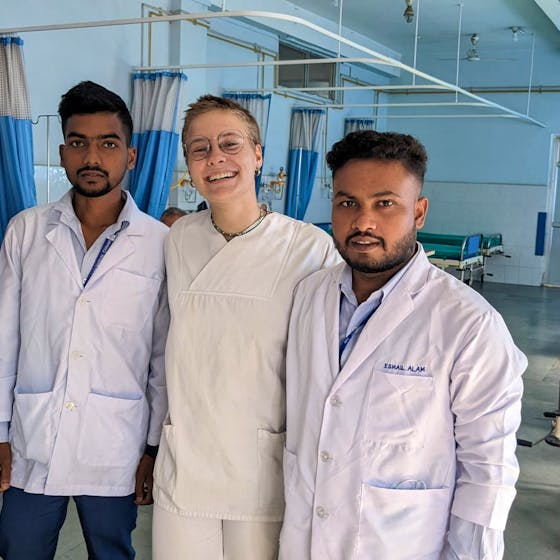
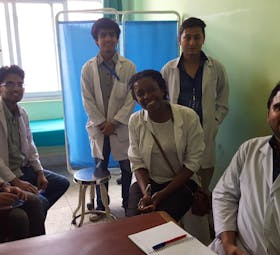
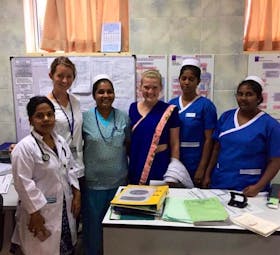
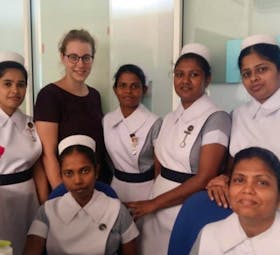
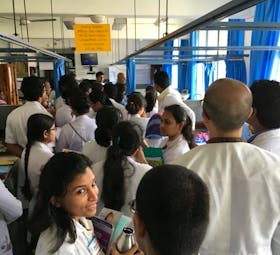

 4.3
4.3

